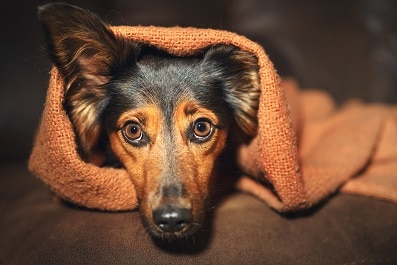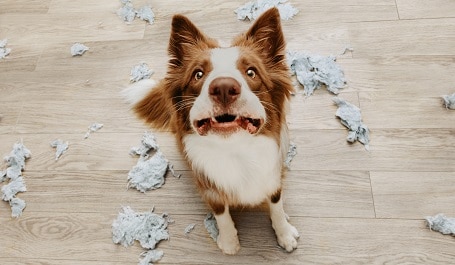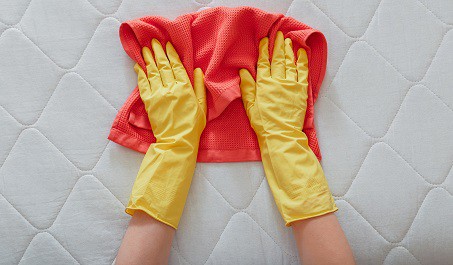A dog suddenly peeing the bed can make you want to pull your hair out! It’s so frustrating when a potty trained dog begins to regress.
A dog might suddenly pee on the bed becauseof:
- Health problems or anxiety
- Another dog that peed on your bed
- Marking territory
- A need for more potty breaks
- Your dog getting older and less able to hold their bladder
Dogs don’t pee on the bed out of spite or anger. It’s usually an accident or a sign your dog feels insecure.
In this article, I’ll discuss why a dog would suddenly pee on the bed, how to stop your dog from peeing on your bed. I’ll also talk about, how to clean dog pee from your mattress and bedding, because once the smell is there, your dog will think it’s fine to pee there again.
Your Dog is Having Health Problems
Visit the veterinarian any time your dog’s behavior changes suddenly, as this is often a symptom of pain or illness.
Regression in potty training is especially worrying, and very often is due to a medical problem.
Various medical problems can cause your dog to suddenly pee on your bed, including diabetes, urinary tract infections, and arthritis.
Beds sometimes provide extra comfort for dogs when compared to peeing on the floor. They’re nice and squishy, with soft pillows and blankets.
If your dog is in pain or having joint issues, this may be their reason for peeing on the bed.
Another reason your dog may pee on the bed is if you allow them to sleep with you at night and they have trouble getting down. They might be physically unable to move or hold their bladder any longer.
You can solve this by using stairs or a ramp made for helping dogs on and off furniture.
Only your veterinarian can diagnose your dog, so be sure to get them an appointment as soon as possible.
Your Dog is Anxious

Dogs can feel anxious much like people. Sometimes it’s just a temporary emotion, while other times it’s indicative that they have an anxiety disorder.
Short-term reactions, such as your dog peeing on your bed once while your neighbors are setting off fireworks outside, are most likely an emotional response. Dog’s bladders sometimes leak if they’re stressed or excited.
On the other hand, dogs who are continually anxious have a bigger problem that might need to be treated by a veterinarian.
Symptoms of anxiety in dogs include:
- Potty training regression (peeing the bed)
- Excessive drooling or panting
- Repetitive behaviors such as pacing or licking
- Excessive barking, whining, or howling
- Destructive chewing
- Aggression
- Depression
- Restlessness
In some cases, anxiety can be treated by desensitizing your dog to their fear. This is basically training your dog so that they learn the thing they’re afraid of is okay.
In more extreme situations, anxiety needs to be treated by your veterinarian—perhaps with medication.
You should always see your veterinarian first if you believe your dog has anxiety. Only they can rule out physical conditions and diagnose your dog.
Major Life Changes Cause Anxiety
One of the biggest causes of anxiety in our dogs is big life changes. This could be anything from a move or a new baby in the household, to a change in schedule or moving their crate into another room.
Some dogs are simply more sensitive than others and, like people, different dogs will respond differently to new situations.
There are many reasons for this, including personality, age, breed, genetics, and socialization. A dog who was well-socialized to many new people, animals, places, and things will typically be more adaptable than a dog who’s been more sheltered.
Some dogs are simply more anxious by nature. Perhaps they began with an anxiety disorder, and something in their life has worsened it. This might cause them to pee on your bed when they weren’t before.
Peeing when anxious might be a dog’s natural response to fear. It’s possible they aren’t able to hold their bladder because they’re so anxious.
Another possibility is that the anxiety makes your dog feel territorial, and they’re seeking some control in their life. Marking territory on the bed might satisfy that desire.
The answer in this case wouldn’t be to try to assert control over your dog, as this might make the problem worse—and if they don’t pee more, they still won’t feel better or less anxious.
Instead, think about implementing a steadier routine or giving them more attention to help them feel safe and secure again.
It’s best to limit disruption in our dogs’ lives as much as possible—for instance, if you bring a new puppy home and already have another dog, try walking and feeding your first dog at the same time every day and still paying them plenty of attention to limit the impact of this huge change.
We can only make educated guesses about why dogs do certain things, seeing as we can’t speak to them or read their minds. That said, there might be even more reasons your dog feels anxious or why they pee on your bed when they do.
Separation Anxiety When You Leave the Room

Separation anxiety is when a dog feels very distressed when you’re away. They might even react when you simply leave the room.
Symptoms of separation anxiety in dogs include:
- Peeing or pooping indoors
- Destructive behavior
- Excessive barking, whining, or howling
- Trying to escape
- Repetitive behaviors such as pacing
These behaviors typically show up while you’re away or before you leave home. Your dog may also cling to you when you’re at home and not want to leave your side.
Separation anxiety is treated much like general anxiety. You can try to condition your dog to be alone by slowly leaving them for short periods and building up over time.
Try giving them something to do, such as a KONG toy filled with a treat they love.
For severe cases, your veterinarian may recommend medication.
Always see your veterinarian first, so that they can rule out physical conditions and diagnose your dog. Then, you can begin doing the techniques I mention above.
Another Dog Has Peed on Your Bed
If another dog has peed on your bed and you haven’t washed it well enough to get out all of the smell, your dog might think it’s okay for them to start peeing there as well.
I had this happen in my living room once and it was incredibly frustrating! It took months to train my dog Charlie not to pee there anymore once the behavior began.
Solve this by cleaning your bedding as well as your mattress very thoroughly. Even if only your dog has peed on your bed, you still want to ensure it’s completely clean.
Otherwise, your dog will continue to pee there again and again.
I’ll talk more about how to clean dog pee from your bed below.
Your Dog is Marking their Territory
Sometimes a dog peeing the bed isn’t an accident—instead, they may be marking their territory.
How can you tell if your dog is marking territory vs. having an accident?
When dogs mark territory, they usually pee in smaller amounts than they might when using the bathroom.
Female dogs and male dogs both mark their territory whether they’ve been fixed or not, but unneutered male dogs are most likely to mark territory.
Lastly, your dog needs a reason to be suddenly marking their territory. This might be:
- A new addition to the household such as a partner, baby, or pet
- A “threat” outside such as a neighbor’s dog or a new lawn care service
- Another life change that has made your dog nervous such as a move
- New scents in your bedroom
Solve your dog marking territory on your bed by:
- Closing the bedroom door, at least while you get the problem under control
- Introducing your dog to the new family member or pet properly
- Paying attention to your dog so that they don’t feel neglected or replaced
- Drawing curtains or shutting windows to make your dog less anxious about the outside world
- Having patience while your dog adjusts to new situations, people, or pets
- Getting your dog spayed or neutered if they aren’t already (here’s a list of low cost programs)
They Need More Potty Breaks
Many grown dogs can hold their bladder for a long time—but that doesn’t mean they should be forced to! Like humans, it’s unhealthy for dogs to hold their bladder for too long.
Grown dogs should only hold their bladder for a maximum of six hours. This means that if you leave them alone for an entire work day, they might pee on your bed!
Keep in mind that all dogs are different, and your dog might need to go pee even more frequently than this.
Puppies and senior dogs can hold their bladder for even shorter time periods, and some dogs with health conditions may also need more potty breaks.
If you work outside the home and don’t have family to care for your dog, consider hiring a dog walker or pet sitter to spend time with them and let them outside.
Doggy daycare is also an option where you drop your dog off to be cared for. This is lots of fun for some dogs, but is more expensive than the choices I listed above.
They’re Getting Older
As I discussed above, senior dogs are less able to hold their bladder than young adult dogs. If your dog is getting older, they may need more potty breaks.
Again, you can accomplish this by:
- Having friends or family stop by to let your dog outside
- Hiring a dog walker or pet sitter
- Taking your dog to doggy daycare
As dogs age, they’re more prone to health problems. Make sure you’re bringing your senior dog to the veterinarian at least once a year for a check-up.
If you haven’t mentioned the peeing to your veterinarian yet, book an appointment as soon as you can to ensure it isn’t health related.
Dogs Don’t Pee out of Spite
One reason many people think their dogs have accidents is out of spite or anger. This can feel true, but isn’t!
Most dogs are people pleasers—that’s what we’ve bred them to be for thousands of years. They’re domestic animals that rely solely on us, and they want to make us happy.
Your dog isn’t peeing on your bed to upset you or because they’re angry.
Especially if your dog has been potty trained, they’re likely peeing the bed because they can’t help it.
Do Not Punish Your Dog
Never punish your dog by scolding them, putting their face in their pee, or hurting them in any way. This will only worsen the problem, and likely will cause them to have more accidents in your house.
Your dog may become afraid of using the bathroom at all, or scared of you—even when you aren’t upset with them.
This fear can also lead to aggression in some cases.
Dominance theory, or trying to show your dog that you’re the “alpha” of the house, has similar effects and should also be avoided.
It’s important to note that this theory has been discredited—it isn’t the way our dogs think, and continuing to use it as a training method is ineffective.
Return to Potty Training 101
What you should do if your dog is peeing on the bed is to go back to the basics of potty training. Begin like you’re teaching a new puppy for the first time.
Create a schedule, focusing on the time your dog is peeing the bed most often. Watch your dog for signs that they’re going to pee, and bring them outside immediately so that they don’t have an accident in the house.
Never punish your dog for accidents, but instead clean them thoroughly (I’ll discuss how to clean your bed below) and reward your dog for using the bathroom outside.
Clean the Bed Thoroughly

If you don’t clean the bed thoroughly after your dog has peed on it, they will continue. The same goes for if another dog has peed on your bed.
Here’s how to clean dog pee from your bed:
- Soak up as much of the urine as possible using paper towels.
- Treat any pee spots on pillows, blankets, or sheets with an enzyme spray.
- Wash your bedding in the washer, or hand wash items that are more delicate.
- Treat your mattress with an enzyme spray, being careful not to soak the area too thoroughly—you don’t want any moisture trapped in your mattress.
- If you have a carpet cleaner with a furniture attachment, use this to clean the mattress—again, being careful not to soak the mattress too much. It’s important to vacuum the water back up thoroughly, until no more moisture is coming out of the mattress.
Always test enzyme sprays in a less visible area before using it on your bedding or mattress.
Also keep in mind that not every mattress can handle enzyme cleaners or carpet cleaners. Always check first so that you don’t ruin your mattress.
Increase Accessibility
If your dog is peeing the bed due to a medical problem or old age, you might need to make it more accessible for them to go potty in an appropriate place.
For instance, you may have to carry them outside, add a staircase beside the bed, or add a ramp to the back door.
Puppy pee pads or grass pads are an option for dogs who cannot make it outdoors anymore.
Lastly, talk with your veterinarian about pain management options or other medications to make your dog’s life easier.
Close the Bedroom Door
When I had a problem with my dog peeing in the living room, the only thing that worked was to thoroughly clean the carpet and to lock him out of the room.
Over time, I was able to allow him back inside without the problem persisting—but this might not always be the case.
If your dog is only peeing on your bed, you might have to keep them out of the bedroom. Alternatively, you could close the bedroom door during the time they tend to pee—such as while you’re gone at work.
For dogs who are used to sleeping with you, consider training them to stay on the ground at night in their own bed or crate.
If you do need to lock them out entirely, don’t make a big deal of it. Treat it like a normal night and eventually your dog will pick up on the new routine.
Try offering them cozy places such as their own bed or spot on the couch where they can sleep instead.
Purchase a Mattress Protector
If you don’t have the heart to lock your dog out of your bedroom, another option is to purchase a mattress protector. This will keep your mattress safe from damage and ensure it doesn’t begin to smell permanently from the urine!
It will also make clean-up much easier, though still a hassle.
Find a mattress protector that is waterproof and made to block pet messes.
Another option is to buy a waterproof blanket. I bought this one from Mambefor a chair when I had problems with my cat urinating on it. It works, and cat pee is notoriously more difficult to protect against than dog urine!
The blanket is good quality, doesn’t crinkle with a plastic texture, and can be used even if your dog stops urinating—especially if you like heavier blankets.
However, it is difficult to clean in a washer due to the waterproof layer. I’ve taken to hand-washing it instead, which may not work for everybody.
Writer: Katelynn Sobus

